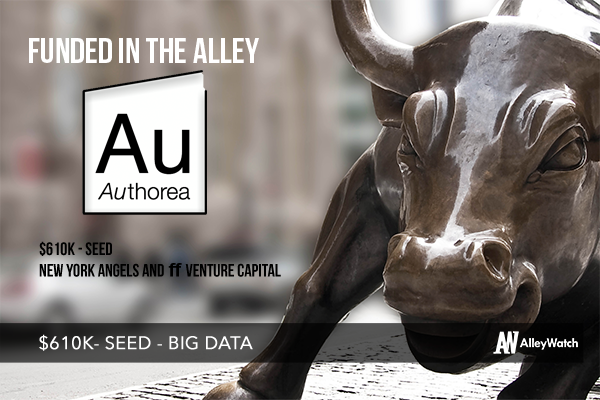Authorea is a digital collaboration platform that encourages more immediate knowledge-sharing in the scientific research community.
Think of it as a GitHub for that community, and considering that we’re talking science, think of the strides that can be made, now that researchers globally have a platform to share information and finding.
Publicly or privately.
The platform certainly moved investors to share the wealth – the company just raised a $610K seed round, and had previously received a $33,000 grant from a Digital Science Catalyst competition.
Co-founder and CEO Alberto Pepe, who has a background in astrophysics — including two years working at CERN in Switzerland, tells us more about the platform, and the science of fund raising.
Who were your investors?
It was a joint investment by the New York Angels group and ff Venture Capital. ff Venture Capital is an institutional venture capital investor in seed-stage companies based in New York City. NY Angels is the largest and most active technology-focused angel investment organization on the East Coast.
What was the funding process like?
Fundraising takes time and patience. I started having investor meetings in January 2014. On a regular week, I would meet 4-5 investors and pitch to them. The seed round was officially closed seven months later- that’s a lot of investor meetings I had!

What are the biggest challenges that you faced while raising capital?
Admittedly, the biggest challenge we had was dealing with lawyers and legal fees. We made a (wrong) decision early on to work with a lawyer who would not defer legal expenses until after the close. The initial estimate we got from the lawyer was reasonable – it was a sum we could afford. As weeks went by, and more and more negotiations and legal support was needed, legal expenses started rising. Paying those bills soon became a problem. You have to consider that we (my cofounder and I) were unemployed at that point. We left our academic jobs to focus on Authorea and fundraising. We had no salary, no health insurance, and a lot of legal fees to pay. At some point, we were literally stuck: the investors gave green lights and were ready to invest in us, but we had no more money to pay the lawyers and thus close the financing documents. Ouch!
What factors about your business led your investors to write the check?
The first investor I met was Brian Cohen. Brian is a superstar investor and entrepreneur who has a strong background and interest in science and scientific communication. I met him at a bar, drink in hand, so it was the best possible environment to talk about science! Our selling point, both for Brian and for the many other investors I talked to during fundraising, is our vision for the future of science, scientific publishing and scientific communication plus the fact that everyone involved in Authorea (from co-founders to developers to advisors) is a scientist. We know extremely well what problems scientists have today because we are scientists ourselves.
What are the most popular scientific topics where collaboration is taking place, that you’ve noticed?
Fields like high-energy physics and astronomy have traditionally been collaborative. For example, a recent paper coauthored on Authorea by a CERN collaboration counts over 200 authors. If we can solve collaboration for CERN, we can solve it for most collaborative endeavors! But besides the typical fields which necessitate large-scale collaboration and large-scale instruments, more and more fields are adopting a collaborative approach. The Polymath Project and the GalaxyZoo, for example, are collaborations that involve both mathematicians (tens/hundreds of them) and “citizen scientists” (for example, thousands of amateur astronomers or cartographers) respectively.
What advice can you offer companies in New York that do not have a fresh injection of capital in the bank?
Bootstrapping is a valid alternative to fundraising for a number of companies. It very much depend on the type of business you’re in. So, I would advise to explore the option of bootstrapping it. In all cases, selling and getting customers is crucial even for those who intend to raise capital. So, my advice is to keep a “bootstrapping mentality,” even after meeting and pitching to investors.
Where do you see the company going now over the near term?
We are currently hiring and we expect to have a team of six people in the next couple of months. Our near term plan is to grow our user base, make more connections with universities and research centers and motivate scientists to write their research articles on Authorea. We enable collaboration and make academic writing happen much faster. The quicker the turnaround for research papers, the faster the pace of science!
From your research, what’s the best bar in NYC to grab a drink after work?
Yes, besides doing a lot of scientific research, I am also known for my nightlife research 🙂 Cafe Select is very close to our offices in SoHo and is a great bar to grab a drink after work.




